Widely regarded as one of the defining series of the 2000s and praised by critics and viewers alike as one of the greatest comedies of all time, Arrested Development remains highly influential as it continues to reach new viewers and fans every year. The series, which originally aired on Fox for three seasons (2003-2006) followed by two seasons on Netflix (2013, 2018-2019), introduces a family that feels like nothing else before it. Created by Mitchell Hurwitz, the sitcom follows the Bluths, a wealthy and dysfunctional family on the brink of crisis when their patriarch is arrested for white-collar crimes.
There is the condescending, elitist, and manipulative Lucille (Jessica Walter) and George Sr. (Jeffrey Tambor), her equally calculating husband. Then their children—the bombastic and theatrical Gob (Will Arnett), the materialistic Lindsay (Portia de Rossi), the self-righteous Michael (Jason Bateman), and the childlike Buster (Tony Hale). Although Michael functions as the series’ straight man, a character who maintains composure and creates humorous contrast to the eccentric characters around him, an ongoing joke is that he is just as shallow and cruel as the family he constantly tries to distance himself from. Other characters include Lindsay’s husband Tobias (David Cross), an aspiring actor whose ambiguous sexuality causes friction within their marriage, and their crafty and independent daughter Maeby (Alia Shawkat). Usually, Maeby stands for the opposite of what her mother stands for in pure defiance and George Michael (Michael Cera), Michael’s responsible and timid son, agrees with whatever Maeby stands for in the hope of getting her attention.
However, even though these characters are deceptive, offensive and selfish, they are often deliciously so. They are heightened and unhinged, almost like caricatures, but at their core, the Bluth family is also like any other family. Plagued by typical familial struggles (including a firm hierarchy and overall poor communication skills), these characters quarrel in a way only certain families can while they all try to live up to unattainable expectations, struggle with various internal pressures, and attempt to gain approval from each other. Concisely, Arrested Development is a cleverly written series about silly, stupid people. Beyond its obvious charisma, the beauty of the series is that it is very dense and rewards viewers’ attention and repeated viewings. There is always something new to discover, as the series is an entanglement of catchphrases, visual details, subtle references and recurring gags with no real beginning or end. It is all about clever writing and satisfying callbacks, sometimes not fully paid off until several episodes later. Additionally, cutaway gags—security camera footage, family photographs, website screenshots, archive material, and flashbacks—are regularly employed to complement the narrative with the omniscient Narrator (voiced by executive producer Ron Howard) tying the multiple plot threads together with his humorous (and meta-textual) commentary.
From losing hands to teaching lessons and everything in between, this article will list the iconic series’ 20 most quintessential instalments to celebrate its 20th anniversary. Arranged in order of release, these episodes are the ones that encapsulate the series’ comedic voice and legacy—episodes that remain as funny today as when they premiered. So put down your Balboa Bay Window Magazine, order your Skip’s Scramble, and join the celebration! And if you think this entire article is a huge mistake, feel free to share your favourite episodes and moments in the comment section.
“Pilot” (Season 1, Episode 1)
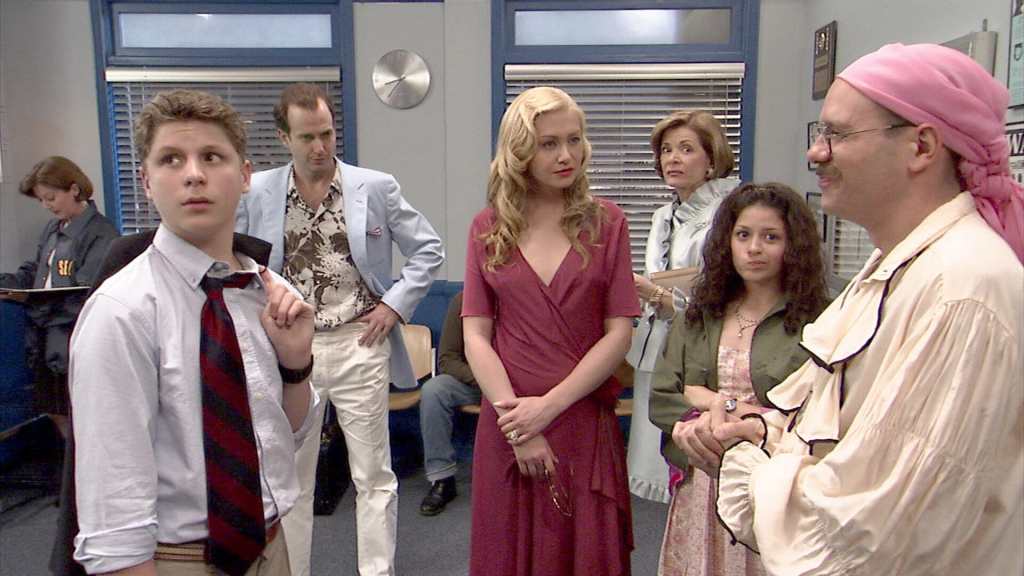
While many TV series often need a couple of episodes to find their footing—especially when it comes to comedies—Arrested Development offers greatness from the start as it succeeds in establishing everything that would come to define the series all these years later. On the day of his father’s retirement party, Michael is confident that he will be appointed the new president of the Bluth Company. To his grave disappointment, George Sr. instead names Lucille as the successor. Just as Michael decides to leave his family for good, the SEC raids the party and takes his father into custody. After discovering the real reason behind Lucille’s promotion as well as noticing how his son longed for his relatives, Michael decides to stay because, even though they are a “disappointing family,” they are still family.
In less than thirty minutes, the episode introduces both the primary conflict of the entire series as well as its distinct comedic rhythm and voice. Moreover, the episode promptly sets up what would become recurring jokes and storylines, including Maeby trying to teach her parents lessons, Gob’s magic acts going awry, Tobias’s ambiguous sexuality, and George Michael’s burdensome feelings towards his cousin (whose name is a play on the fact that they may not be related). Aside from being a textbook example of a great pilot episode, each actor is allowed a moment to shine as their respective characters. From Lucille’s dramatic “Look what the homosexuals have done to me”-entrance to Gob’s determination to gain credibility and respect by correcting anyone who inaccurately refers to his magic acts as tricks, all nine family members are sharply defined. Although they all have distinguishing quirks, they are also very alike—this is perhaps best highlighted when they are more appalled to learn that the company expense account is on pause than when they learn that George Sr. will stay in prison indefinitely.
“Top Banana” (Season 1, Episode 2)
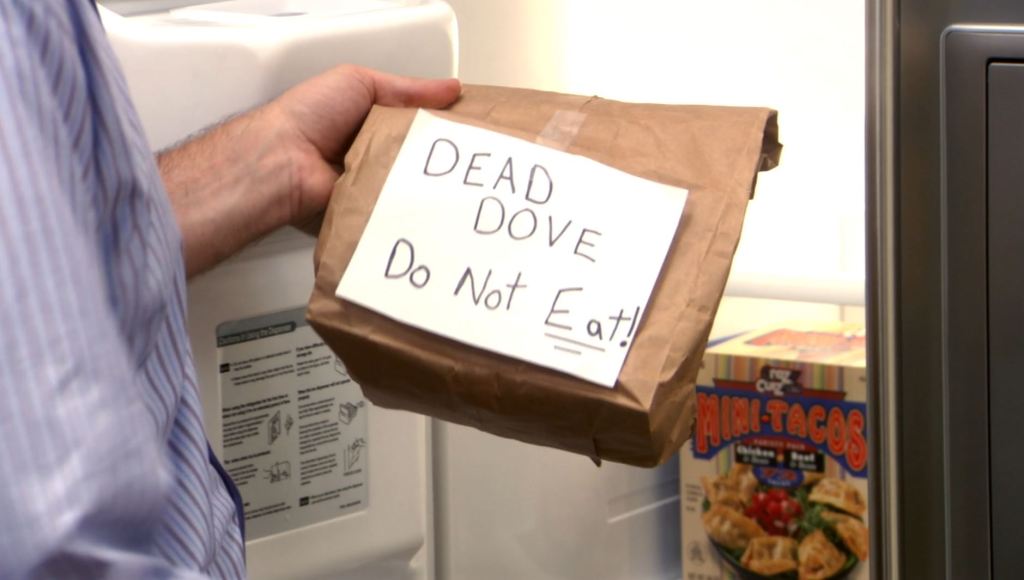
If the pilot was merely an introduction, the second episode unquestionably manages to solidify the series’ place in comedy history with its numerous quotable lines and memorable moments. While this certainly includes Michael looking inside a peculiarly labelled brown bag (along with his deadpan response to its contents), I appreciate the beauty of anything smallish and straightforward. A personal favourite is when Tobias picks up a magazine about tractor pulling—assuming it was an outlet for actors—simply due to the accidental covering of the first two letters.
While the episode features a handful of twists typical for the series, it also marks the first outing of “There’s always money in the banana stand,” a recurring line referring to the long-running stable in the Bluth empire that sells frozen treats. Sadly, in this episode, the saying is literal. “Top Banana” focuses on a myriad of miscommunications that make situations exponentially worse, as well as the ongoing issue of either living or failing to live up to expectations. In this case, Michael, George Michael, and Gob are all trying to prove to those close to them that they are capable and reliable people—which ends in various misfortunes. Moreover, after realising in the previous episode that acting is his destiny, Tobias is offered his first big acting break in a commercial—only to miss out on the phone call with the opportunity, something which will become a recurring gag.
“Key Decisions” (Season 1, Episode 4)
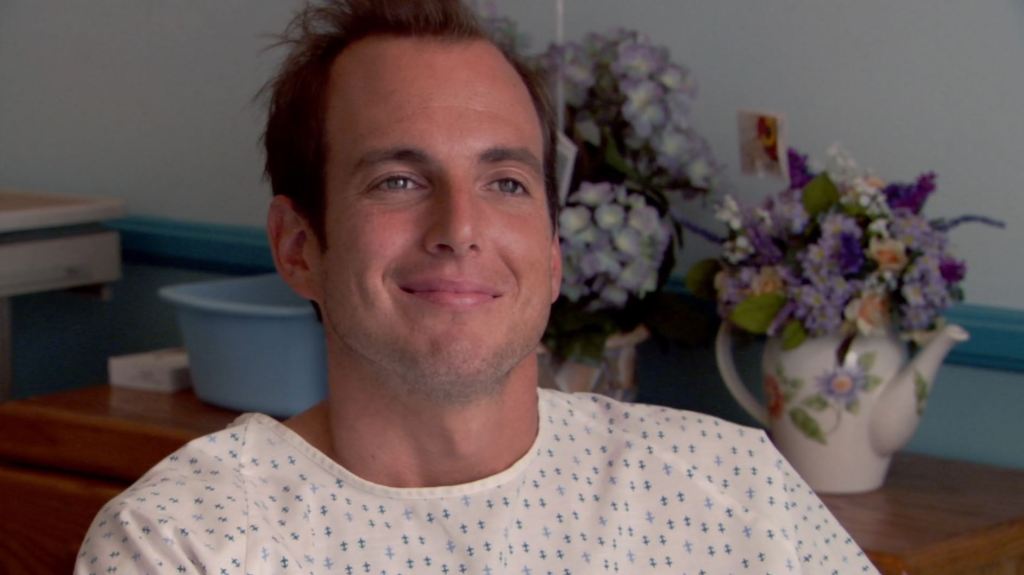
In this episode, Gob arranges for his own incarceration, only to break out 24 hours later in a publicity stunt to further his magic career. Since he will miss out on accompanying his girlfriend Marta (Leonor Varela) to her awards show, he instructs Michael to escort her (who will spend the evening falling for her). At the same event, Lucille encounters her frenemy Lucille Austero/Lucille 2 (Liza Minnelli), and they engage in hilariously vicious chit-chat. At the model home, Lindsay attempts to save an old tree from being demolished, only to realise that instead of being the dedicated activist she always assumed, she is just as greedy, selfish, and vain as the rest of her family.
The first season’s fourth episode continues the trend of introducing segments essential to the series’ essence, including the first use of one of Gob’s most famous expressions (“I’ve made a huge mistake”) and the tremendously amusing bulky stair car. Few things are as delightful as when an actor takes a seemingly bagatelle line of dialogue and makes it hilarious based on delivery alone, which Walter and Arnett consistently do incredibly well with their respective characters. In this episode, Walter offers unforgettable moments. Whether it is her deliciously entertaining chemistry with Minnelli or her laughing loudly at her own joke about why people hate hospitals, it is a joy to watch her embodiment of Lucille. Apart from Walter’s performance, the finest parts of the episode involve two jokes. The first one occurs just when Michael is about to disclose his attraction to Marta, only for her to receive a phone call informing them that Gob has been “stabbed in the back.” That wording is one of the series’ most satisfactory double-meaning witticisms and it’s only further underlined by Arnett’s beautiful delivery of “Ta-da” when Gob wakes up in the hospital after the attack— technically out of the prison.
“In God We Trust” (Season 1, Episode 7)
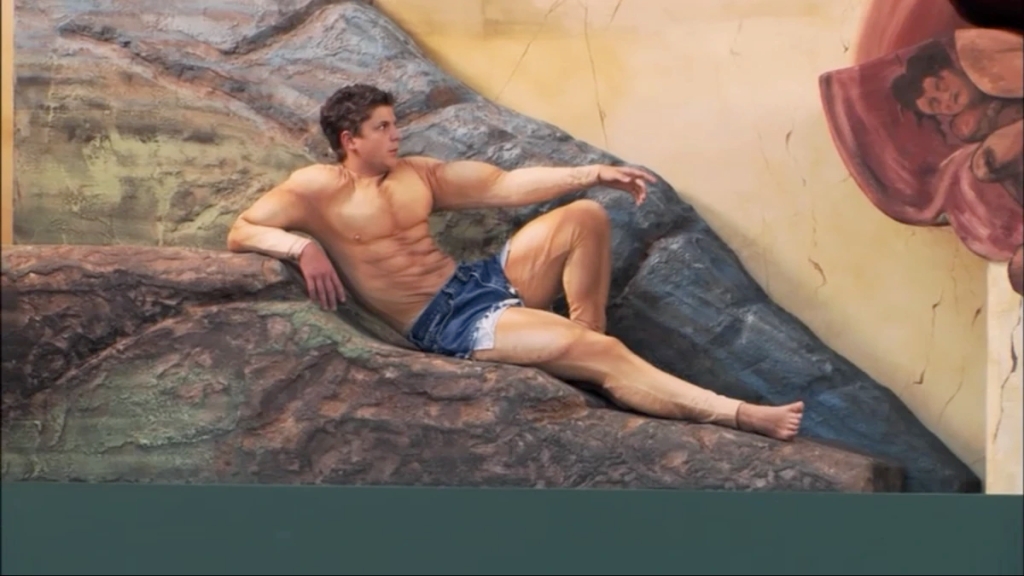
When watching Arrested Development, one will quickly learn that whenever Bluth family members try to do something for their own benefit, it usually backfires terribly. In this episode, George Sr. is to be released for an afternoon to participate in the Living Classics Pageant, an Orange County tradition featuring living representations of works of art. The patriarch will portray God in Michelangelo’s The Creation of Adam, while Buster, George Michael, and Tobias all have their motivations to obtain the role of Adam. Meanwhile, Maeby feels ignored by her self-involved parents and tries to teach them a lesson, Michael tries to learn Spanish to get close to Marta (but only finds a learning tape consisting of business phrases), Buster and Lucille 2 go on a date, and Lucille pits Michael and Lindsay against each other because she’s annoyed that they are being friendly.
Barry Zuckerkorn (Henry Winkler), the family’s eccentric and ill-prepared lawyer, makes his first appearance, as does Tobias’s affliction of being a ‘never-nude’ (he wears denim cutoffs underneath his clothes at all times). Due to his own experience, Tobias wrongly assumes that George Michael is a fellow ‘never-nude,’ all because he refuses to remove the muscle suit belonging to the role of Adam and therefore Tobias spends time trying to help him accept his affliction. Contrary to what Tobias believes, Maeby compliments George Michael while he is wearing it, which causes him to wear it all the time in the hope of it happening again.
“My Mother, the Car” (Season 1, Episode 8)
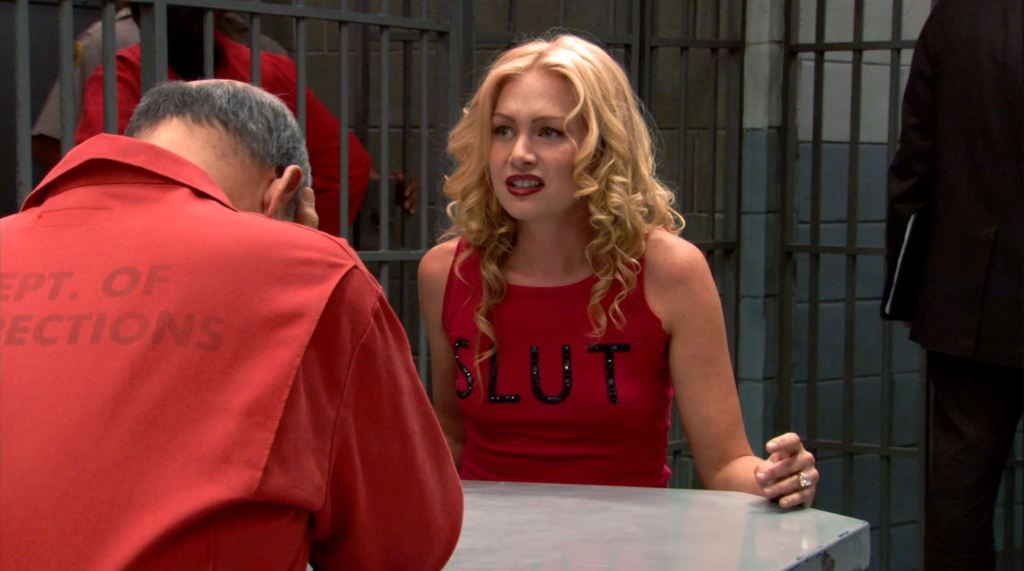
This episode marks the first mention of the French film about two cousins with a forbidden love, Les Cousins Dangereux—a film that unsurprisingly catches the attention of George Michael. Since the film is R-rated, George Michael tries to obtain fake passports—French passports specifically, because he likes the way they think—so he can watch it with Maeby. Meanwhile, Buster takes the next step in his relationship with Lucille 2 and Lindsay is unpleasantly surprised when she finally visits her father in prison and learns that no inmates pay any attention to her (her red top spelling out “SLUT” in bedazzled letters is a standout fashion moment of the series).
Then there is the Bluth family dynamic, hilariously albeit terrifyingly captured through the celebration of Lucille’s birthday. After agreeing to throw a surprise party at a restaurant, Michael is surprised to discover that no other family member has shown up when he arrives with an exuberant Lucille. Michael talks with his siblings and they agree to appear for the upcoming compensation dinner, only to repeat their actions. Their behaviour disappoints Michael and causes Lucille to feel unloved, so despite knowing that she is a terrible driver, Michael allows Lucille to drive them home—a decision that ends with a crash as Lucille tries to run down a man on a Segway, believing it was Gob. Even more worrying, Lucille attempts to pin the accident on an amnesiac Michael, who has no memory of the details of the accident.
“Storming the Castle” (Season 1, Episode 9)
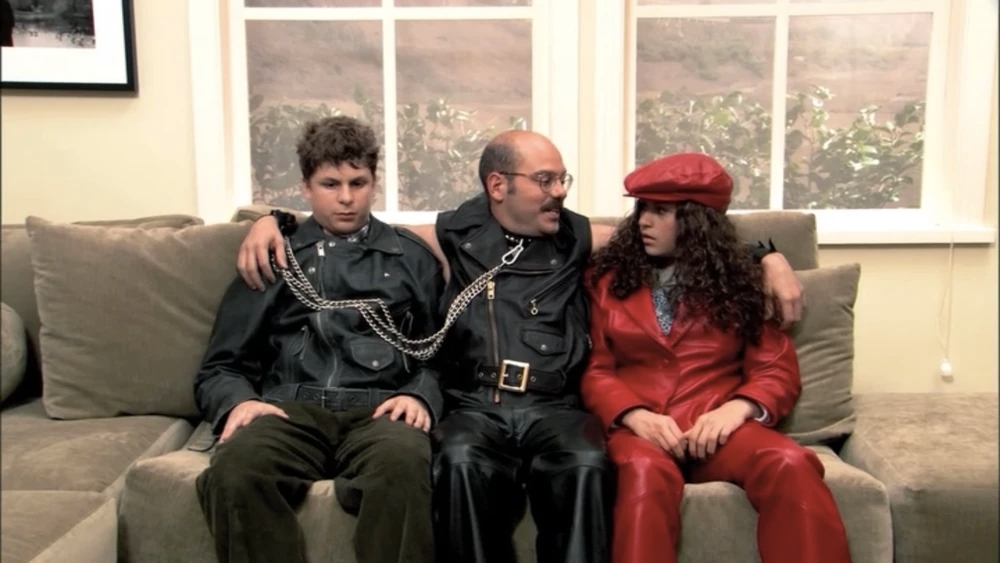
This episode tackles a recurring inner struggle for Michael. When Lindsay emphasises that Michael is too much of a “good guy” to make a move on Marta, Michael decides to go against his characteristic beliefs and devise a plan for Marta to meet Gob’s assistant (and current lover). Ultimately, he does not follow through with his plan. Due to this decision, he confirms Lindsay’s statement and a big focus of the episode is how one cannot change the fundamental parts of oneself.
One of the more memorable moments of the episode unravels when Michael is stopped on his way to work by magician Rollo, who tells him to get in his car if he cares about his brother. A calm Michael asks which brother, and when informed that it is Gob, he leaves on his bike. Moreover, a great example of wordplay typical for the series happens when Gob shakes Michael’s hand and tells him that he appreciates his time—only for Michael to realise that Gob stole his watch. Other notable aspects of the episode include George Michael trying to be macho (once again underlining that one should not try to be something they are not) and the first use of Europe’s “The Final Countdown” (Gob’s favoured song choice for his magic acts). Besides that, Maeby decides to be pro-leather to spite Lindsay and, as Tobias is trying to bond with Maeby, he buys a “leather daddy” outfit (which will not result in a deeper connection with his daughter but instead leads him to a gay bar).
“Pier Pressure” (Season 1, Episode 10)
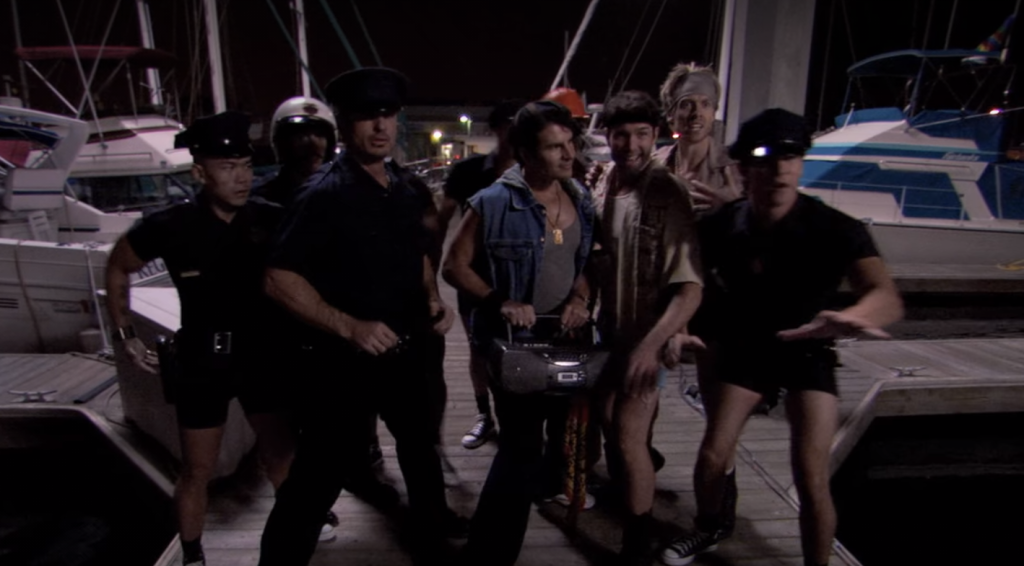
The tenth episode of the first season does what Arrested Development does best—combining the chaotic and unhinged while still feeling grounded—and it is no wonder why it is such a fan favourite. When Michael sees his son punishing himself too harshly for an A- grade, he encourages him to take a break. However, instead of trying to have some fun, George Michael heads to the banana stand to work. There, Buster arrives to ask him to buy some marijuana for Lucille 2, who is suffering from vertigo. Trying to do the right thing, George Michael turns to Gob for help, who in turn tells Michael (who jumps to the conclusion that George Michael is buying it for himself). Following the footsteps of his abusive father—infamous for the staged scenarios he executed to teach his children lessons while they were growing up—Michael enlists Gob’s stripper friends to fake a drug bust at the family yacht to scare George Michael straight.
The delightfully structured episode—essentially about teaching a lesson to not teach lessons—also features J. Walter Weatherman (Steve Ryan), the one-armed man George Sr. used in his own lessons. Meanwhile, Lindsay worries that Maeby’s poor grades can set her on a rocky path in life and she forces Maeby to spend time with Lucille as punishment. On the subject of the more recurring bits, Buster continues to greet people by their relationship to him rather than by their name (for instance, he greets George Michael by saying, “Hey, nephew”).
“Marta Complex” (Season 1, Episode 12)
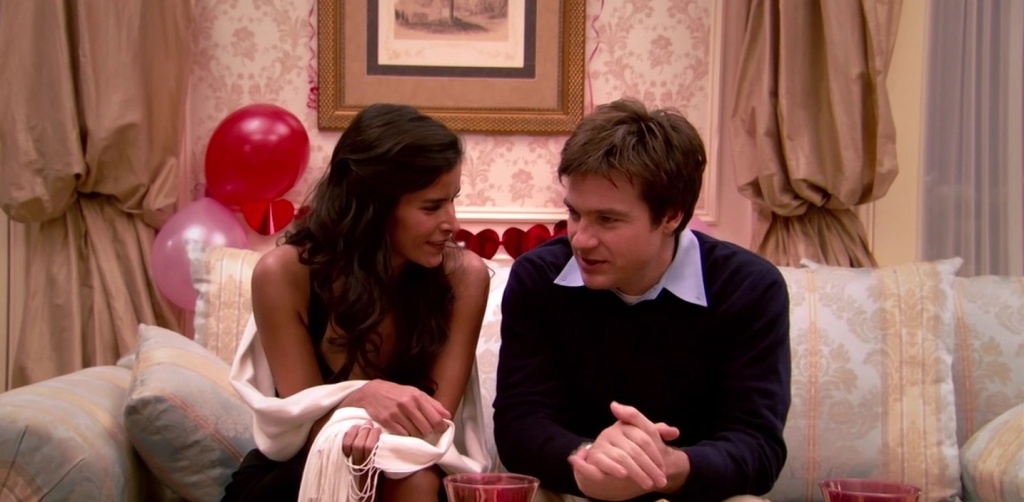
In this episode, George Michael investigates his cousin’s parentage to try and justify his crush, Buster moves out of the penthouse (and Lucille discovers that living alone can be enjoyable), and Lindsay and Tobias have intimacy issues due to his ‘never-nude’ affliction. Moreover, Carl Weathers—possibly the thriftiest person in the world—spends a lot of time talking about making stews (each delivery of, “Baby, you’ve got a stew going” is gold) and less about acting, which upsets Tobias, who hired him to be his acting coach.
Furthermore, “Marta Complex” features one of the simplest yet funniest gags, namely the moment the Bluths begin to chant “speech” repeatedly to no one in particular, and therefore, no speech commences. When Michael eventually caves, he gives an impassioned speech about love that makes Marta realise that she has feelings for Michael. As she comes to this realisation, the silly Hermano storyline begins, which ties in with the recurring joke that numerous Bluth family members either misinterpret or do not understand the Spanish language. Gob suspects Marta is cheating on him with a man called Hermano and asks for Michael’s help to track the mystery man down, which he does despite it being a conflict of interest. At one point, the trail leads Michael to the set of Marta’s soap opera, where a wonderfully ridiculous miscommunication ensues. When Michael asks for “Hermano,” one of the actors thinks he is referring to their brother and steers Michael in said brother’s direction—only for that brother to get asked the same question and guide Michael back to where he came from.
“Beef Consommé” (Season 1, Episode 13)
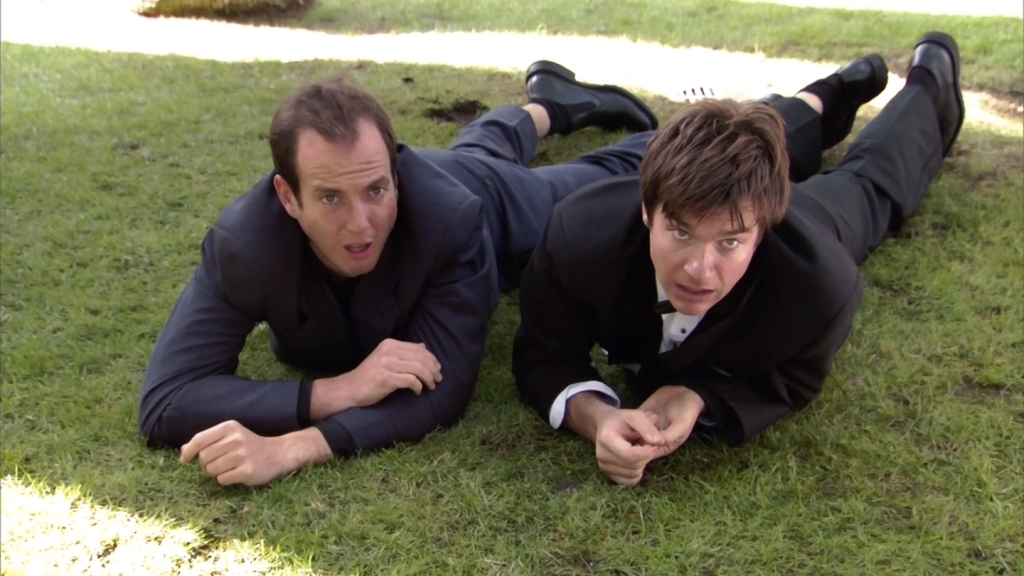
The family must appear at an arraignment hearing, but Michael and Marta’s growing guilt and Gob’s hunt for his unknown rival jeopardise the proceedings. After admitting that they have feelings for each other, Marta and Michael decide to get permission from Gob before taking things further (Gob’s cover of John Paul Young’s “Love Is in the Air” coming on shuffle when they are trying to have sex does not help to lessen the guilt). Naturally, this will end disastrously. Further storylines in this episode include Buster trying to achieve his dream of joining a fight and getting punched in the face and Tobias struggling with his ‘never-nude’ distress, only to end the episode with him overcompensating.
While the series regularly flirts with the idea of being a documentary—hands cover the camera lens during inappropriate moments, boom mics and camera operators are left visible within the frame—“Beef Consommé” moves beyond just toying with it on more than one occasion. For example, a judge orders the cameras to be removed from the courtroom (due to this, the next shot is from outside the courtroom doors) along with the camera left outside of the room where Lindsay and Tobias get naked after temporarily overcoming his affliction.
“Staff Infection” (Season 1, Episode 15)
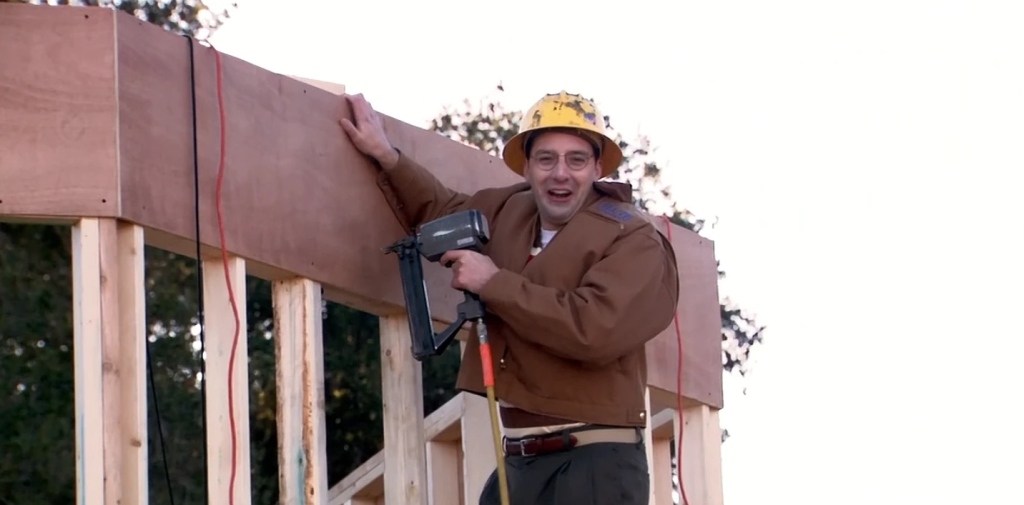
The Bluth Company is under financial strain, and when Michael discovers that the family have all been on the company payroll for doing nothing, he puts them to work. While Gob and Buster join a construction crew (which results in a face-off between the two brothers á la Footloose), Lindsay becomes Michael’s receptionist. In the meantime, Tobias joins George Sr. in prison to do research for an acting role and Lucille introduces her newly adopted son to the family. Seemingly knowing no English, the boy (Justin Lee) greets the Bluths by saying “annyeong” (Korean for “hello”). Whenever a family member repeats this word, so does the boy, which causes Lucille to assume that his name is “Annyong” (in fact, his name is Hel-loh).
The fifteenth episode carries on with the theme of accidental incestuous comments, as Gob underlines how sexy Michael’s receptionist sounds on the phone (unaware at the time that he was speaking to his sister). This episode also features Gob getting up to various antics, including his notorious chicken dance and using his Segway on terrain it should not be operated on. With Michael momentarily absent from the office, Lindsay takes charge of the firm and treats the employees to lunch—only for them to accidentally board the bus Lucille’s housekeeper Lupe (BW Gonzalez) had rented for her family reunion on Catalina Island. With the employees gone and Lupe’s relatives abandoned, Lindsay decides to put the latter to use when she hears that work has halted at the construction site. A great thing about Arrested Development is how it can create big laughs from little jokes. An example of this unravels when one of Lupe’s relatives stands on top of the stair car and hits his head on a sign that reads “Drive safely” as they enter the building site.
“Let ‘Em Eat Cake” (Season 1, Episode 22)
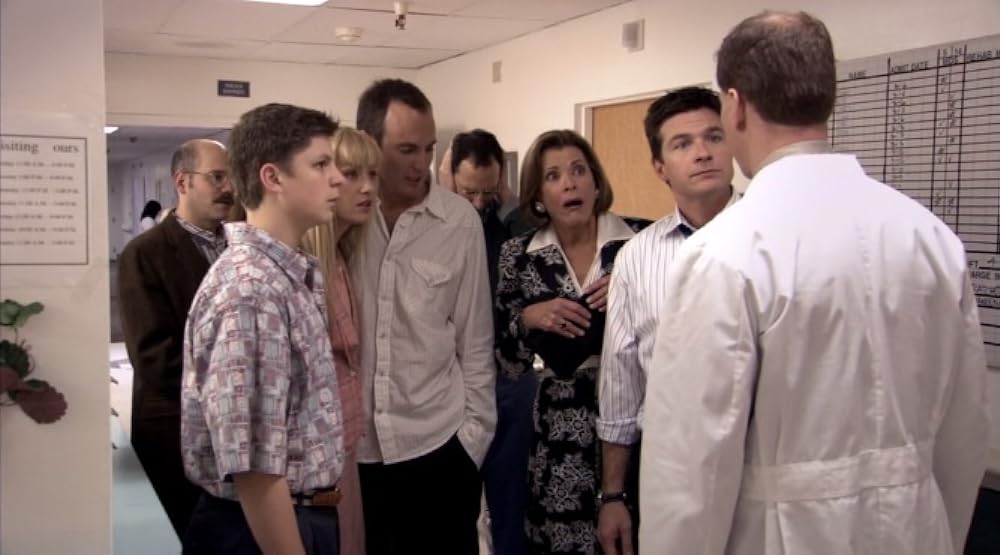
In the opening scene, the family’s model home shows signs of breaking down and, when Michael sees a news report featuring a house uncannily similar to theirs (down to the very same defects) located in Iraq, he realises that his father’s crimes might be worse than initially imagined. Meanwhile, Tobias enjoys the taste of success when a book he had written years earlier gains an audience and Lindsay—who has a history of starting up numerous failed companies—wants to get into the beads business. When she announces this, Gob is nearby thinking she is talking about bees, to which he begins making buzzing noises and voicing his interest in starting a bee business.
The episode tackles recurring themes, including Michael wanting to leave his family but struggling due to his loyalty. Lindsay experiences a similar cyclical thing as she expresses a desire to leave Tobias. The best cutaway joke involves a white screen saying “footage not found” when Tobias tries to convince Lindsay that they have had great times during their marriage. Furthermore, a love interest for George Michael named Ann is introduced and will be a part of one of the longest-running gags in the series (all Bluths, apart from George Michael, struggle to remember her name). This marks the only appearance of Alessandra Torresani as Ann (Mae Whitman portrays the character for the remainder of the episodes). This episode also marks the first appearance of Dr. Fishman (Ian Roberts), a doctor whose misleading literal statements often give the family false hope or, as in this episode, unnecessary grief when he tells the family that they have “lost” George Sr.—making them think he is dead when, in fact, he has escaped and is fleeing the country.
“The One Where They Build a House” (Season 2, Episode 2)
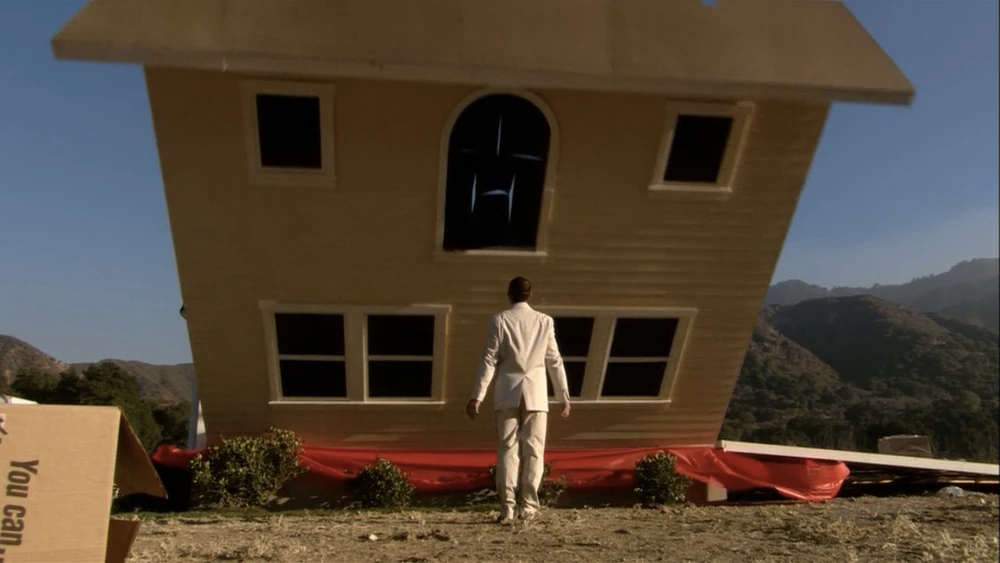
This episode, which uses a Friends-style title, features George Sr.’s twin brother Oscar heavily implying that he’s Buster’s biological father, Lindsay and Tobias deciding to have an open relationship with varying results, and Michael being disgusted when he learns about the mayonnaise and egg combination Ann has invented. Above all else, the episode focuses on the relationship between Gob and Michael.
To prove himself worthy of a higher position at the company, Michael presents the idea of developing a second model home and hosting a flashy ribbon-cutting ceremony to create buzz. However, during the board meeting, Gob steals the spotlight by performing magic, cutting the scope from Michael’s two months to two weeks, and showing off his new employee Starla (Mo Collins) and her “Solid as a Rock” tagline (clearly alluding to Iraq). In private, Gob tells Michael that they can build a fake home to trick the board and Michael employs Oscar, George Michael, and film star Tom Jane (Thomas Jane portraying a fictionalised version of himself) to help. Buster, who recently learned that the army’s recruitment is so low that they have to accept him despite his faults, gladly helps out in the hope of getting injured—which results in a homage to Buster Keaton and Steamboat Bill, Jr.
Throughout the episode, a handful of jokes highlight Gob’s struggles. For instance, when he buys a boat, a sign in the background reads, “Nothing creates the illusion of Success like a Boat.” Moreover, when the first letter falls off from his “President” tag on his Segway, it more fittingly hints towards his personal and professional reality. Despite amusing details, there is one joke that stands above all others. Throughout the episode, the game ‘rock, paper, scissors’ is referenced and the entire point of this article might as well have been to include the following bit: during the ribbon-cutting ceremony—which unravels disastrously—Michael and Gob end up fighting each other using a giant scissor and a giant rock as the Narrator cuts in to say, “Unfortunately, the whole incident was covered by the paper.” No notes.
“¡Amigos!” (Season 2, Episode 3)
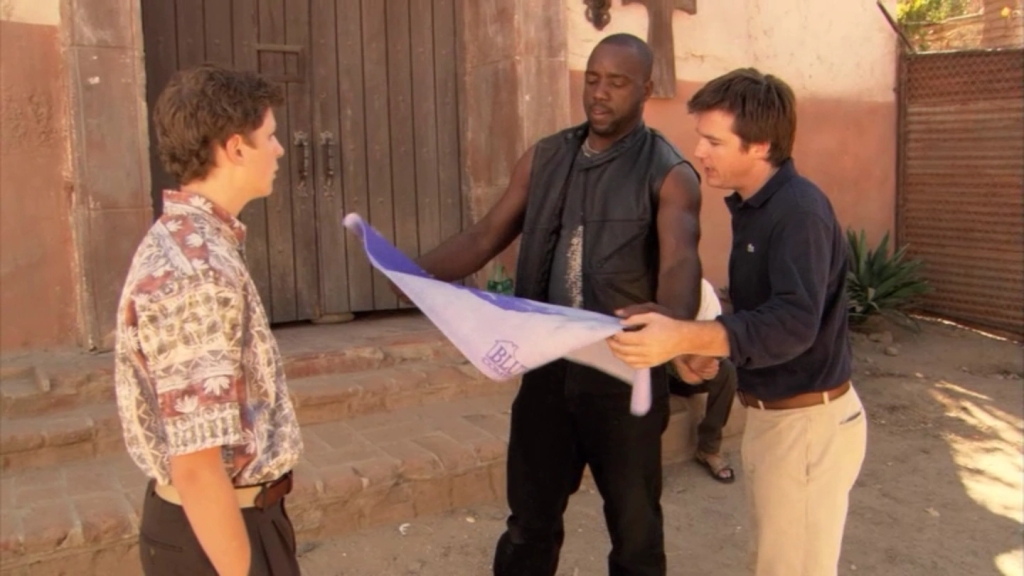
Private detective Gene Parmesan (Martin Mull) shows up in one of his many disguises to inform Lucille and Michael that George Sr. has been hiding in Mexico since fleeing the country. Accompanied by George Michael and his girlfriend, Michael drives to collect his father. To his son’s disappointment, Michael spends no time trying to get to know Ann (“Her?”). Meanwhile, Gob hires bounty hunter Ice (Malik Yoba) to tail them—and possibly act as his friend—and Buster sneaks into Michael’s trunk, hoping to escape to Mexico and avoid going to Iraq for the military. Yet, due to losing his glasses and breathing in carbon monoxide, Buster’s judgement is unreliable and, instead of getting out in Mexico, he gets out at Lupe’s house in a town only six minutes inland from his own. When entering her house, he is surprised that they own so many things he used to own (unaware that Lucille had donated them). Upon seeing his former chair shaped like a hand, Buster comments, “I’d never thought I’d miss a hand so much”—perfectly foreshadowing his later faith. In Mexico, the family hires Ice to track down George Sr. while they return home—only to realise that they left Ann behind.
This early season two episode presents a contrasting mixture of small jokes hidden in plain sight with bolder ones that stay long after finishing watching. One prominent detail includes Tobias leaving blue prints all over the model home since he colours himself blue every night in case the Blue Man Group (the performance group, not the group of depressed men) needs him as an understudy. Another joke utilises motivational posters seen in the background. For instance, “Keep An Open Mind” is seen when Michael talks about Ann (someone he does not like) and when the “Never Give Up” poster falls in Gob’s office, he says to leave it as it is. Other humorous moments include Tobias delivering an extremely dark joke at the expense of Michael’s dead wife (“I know you’re the big marriage expert. Oh, I’m sorry. I forgot. Your wife is dead”), Starla mistakenly using a photo printer instead of the big company printer when printing copies and Lucille suggesting that Annyong should “go see a Star War.”
“Good Grief” (Season 2, Episode 4)
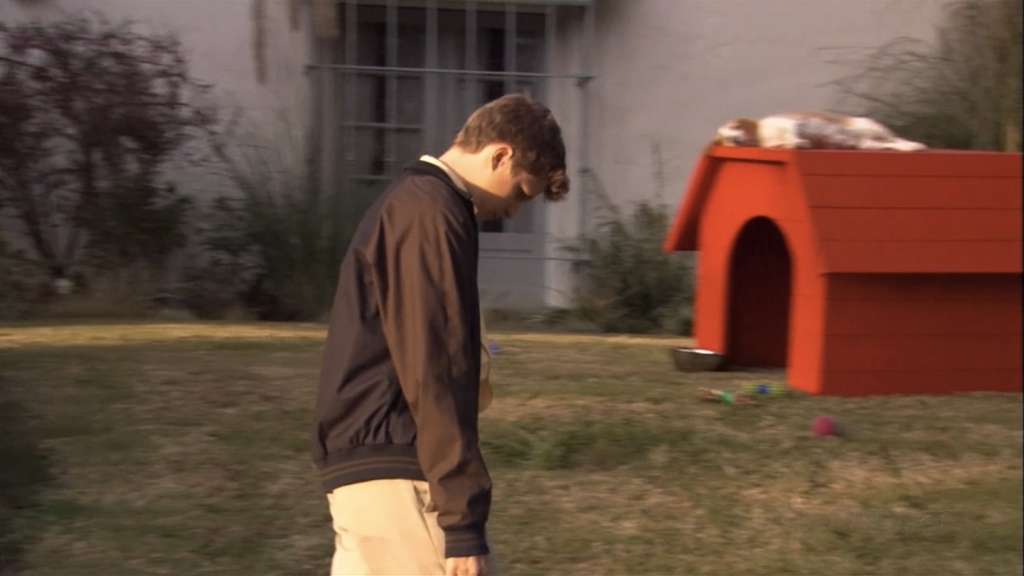
Even though Arrested Development has managed to sprinkle numerous references to the long-running comic strip Peanuts throughout its run, this episode is especially noteworthy. Besides its title, “Good Grief” features the following homages: a crooked sign on the banana stand similar to Lucy van Pelt’s psychiatric help booth sign, a beagle lying on top of a red dog house mimicking Snoopy, and multiple characters (George Michael, George Sr., Tobias, and Gob) walk sullenly with their head dropped à la Charlie Brown to indicate sadness while “Christmas Time Is Here” by the Vince Guaraldi Trio from the TV special A Charlie Brown Christmas plays (none funnier than George Michael after Ann breaks up with him). These references are all more or less ridiculous, but they create some of the biggest laughs— proving that sometimes the goofy ideas are the best.
After learning that George Sr. is dead, the Bluth family decides to throw a wake. However, as Buster has a history of violence when hearing bad news, they have him believe it is a darkly themed birthday party. Gob, who is enraged after seeing his rival Tony Wonder (Ben Stiller) on the cover of a magazine for magicians (“I should be in this Poof!”), decides to throw an elaborate illusion at the wake as revenge. Meanwhile, Maeby wants to get emancipated and a heartbroken George Michael discovers that George Sr. is not dead but in hiding. He moves him to the model home’s attic and, unbeknownst to everyone but George Michael, George Sr. watches his own wake.
This episode features Buster wearing one of Gob’s old stripper uniforms, a wonderful cutaway montage of Gob’s misunderstood advances towards a company employee, and possibly the funniest hint from Oscar about being Buster’s father (“It’s your father’s birthday, which coincidentally is…my birthday”). Additionally, Michael incorrectly assumes that George Michael is talking about Ann when he mentions “Pop Pop” in the attic. “The mere fact that you call making love Pop Pop tells me you’re not ready,” is Michael’s sole reply to a confused George Michael, who was only talking about his grandfather.
“Afternoon Delight” (Season 2, Episode 6)
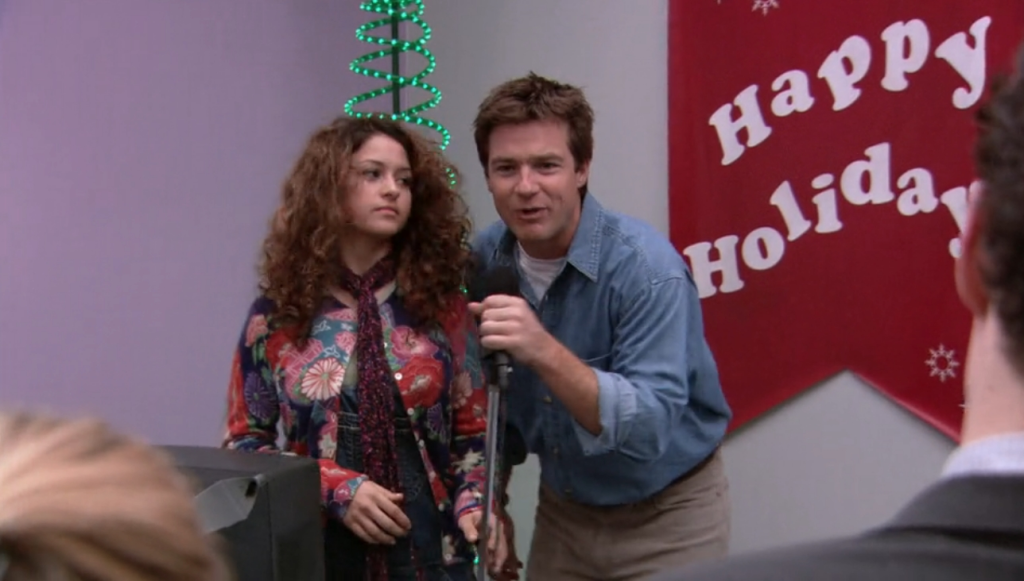
Due to a local holiday tradition, Michael finds the banana stand vandalised by teenagers and heads home to collect his son to engage in their yearly tradition of rebuilding it. However, as George Michael is too busy to help—he is planning to attend a Christmas party Ann’s religious family is throwing—Michael rebuilds the stand alone until Maeby arrives to assist him. They bond and make plans to attend the upcoming office party together.
After struggling to fill his father’s shoes (literally, as they do not fit) and finally getting into his father’s pants (he has altered the pants), Gob is excited about the company party as he believes his co-workers will honour him—ignorant about the fact that he has been alienating everyone at work. Gob has a miserable time, similarly to Lindsay. As Michael and Maeby have a wonderful time and perform karaoke together, George Michael and Lindsay feel abandoned and leave the gathering prematurely. They are not around to discover, as Michael and Maeby did, that the song “Afternoon Delight” is not as innocent as the melody might suggest. During the company’s second Christmas party—a plea to rehire everyone after Gob fired the staff after the first party—Lindsay and George Michael decide to mirror Michael and Maeby from the first party in their attempt to bond.
Unsurprisingly, the second party also ends in disaster. Under the effects of Oscar’s marijuana, Lucille rams her car through the party, runs over Tobias, and traps Gob inside the banana stand as she crashes into it. Meanwhile, Buster never made it to the army but instead became hooked (foreshadowing the replacement of Buster’s hand with a hook) on playing with a nearby skill crane machine. Buster hears the turmoil unravelling nearby and decides to be a hero when he spots a real crane on the docks and saves Gob.
“Hand to God” (Season 2, Episode 12)
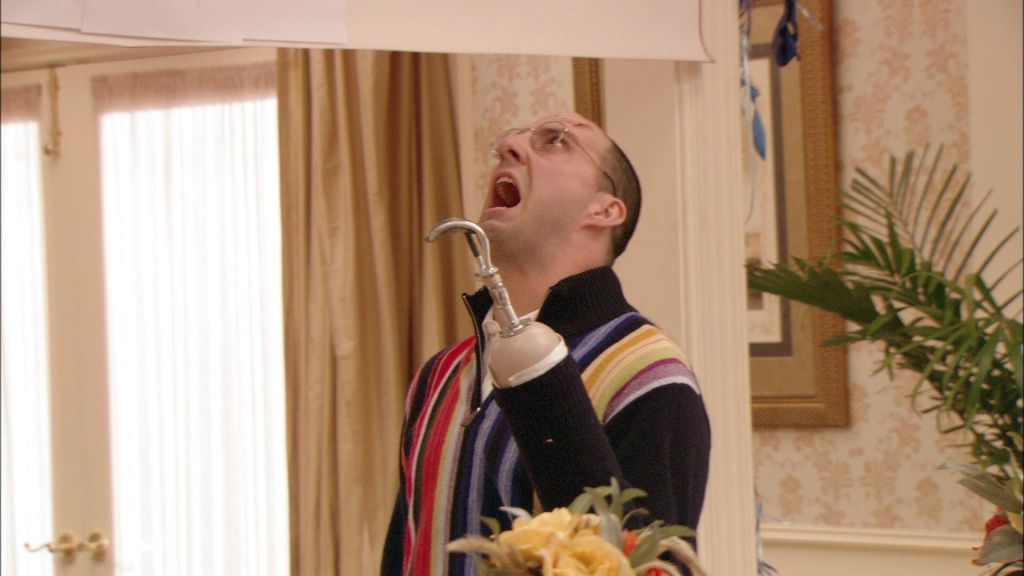
“Watch out, a loose seal,” a stranger shouts, but Buster dismisses the warning (he thinks the person is yelling about Lucille) and consequently gets attacked by a seal. When the family arrives at the hospital, Dr. Fishman delivers one of the most iconic moments from the series when he tells the anxious family that Buster will be “all right” (referring to him losing his left hand). When Buster returns from the hospital, fitted with a metal hook prosthetic, he finds the family gathered in Lucille’s penthouse. At the welcome home party, Michael receives confessions from both Lucille and Gob about who might have been the one responsible for the accident, with the latter being the most convincing as Gob released a seal into the ocean after giving it a taste for mammal blood (cut to a flashback of Gob releasing the seal while saying, “You’re not going to be hand-fed anymore”).
Throughout the episode, Buster struggles to come to terms with the loss of his hand and ends up hurting both himself and others. When he accidentally gauges Oscar during a massage, he goes on a rampage, trashing Lucille’s apartment and revealing the aptly titled “You’re Killing Me, Buster” banner (originally from “¡Amigos!”) underneath the “Welcome Home, Buster” banner. This episode also features Michael struggling with the idea that he might not be as much of a “good guy” as he considers himself to be, as well as Lindsay continuing to be oblivious about Maeby’s whereabouts (she is not with her debate club but instead overseeing a remake of The Old Man and the Sea called The Young Man and the Beach for the film studio where she had bluffed her way into a job despite being way too young).
“Making a Stand” (Season 3, Episode 8)
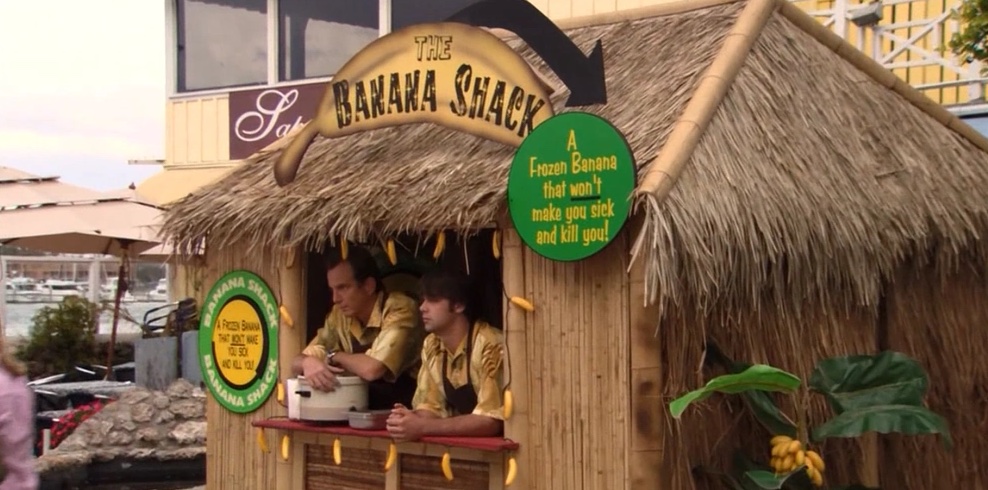
This episode heavily mirrors “Pier Pressure” as Michael and Gob set out to teach their father a lesson for his years of pitting them against each other. At the Bluth Company, Michael tries to include Gob more in the business but with little success since his ideas are both illogical and illegal. To encourage Gob, Michael suggests that he should open his own banana stand, which he very competitively does next to the original stand. The opposing stands try increasingly more desperate tactics to win customers—including George Michael using a jetpack—but they soon realise that they are only puppets controlled by their father. Coming to this realisation, they decide to work together to get revenge, a plan that will include twists, staged kidnappings, and J. Walter Weatherman. Meanwhile, Maeby is struggling with her studio’s new horror movie but finds inspiration after seeing the blistered and bruised face of a post-facelift Lucille, and Lindsay is trying to attract her divorce attorney, Bob Loblaw (Scott Baio).
Funny things worth noting that occur in this episode: instead of legal notes, Tobias only has a pile of his headshots in front of him during the mediation meeting and when Michael and Gob hug, Gob reassures Michael that if he feels something moving it is just his bird—but the bird is visible on the nearby table. Furthermore, “It Ain’t Easy Being White” (a song from the CD Gob created with his poorly executed ventriloquist act Franklin that he hoped would “break down racial barriers and maybe be a crossover hit”) is accidentally played twice. The funniest wordplay shows Michael saying “haemorrhaging money” while coins unexpectedly explode out of Gob’s sleeves. According to the Narrator, “Michael was overwhelmed by the change,” referring to both the literal change and the change of having Gob around at work.
“S.O.B.s” (Season 3, Episode 9)
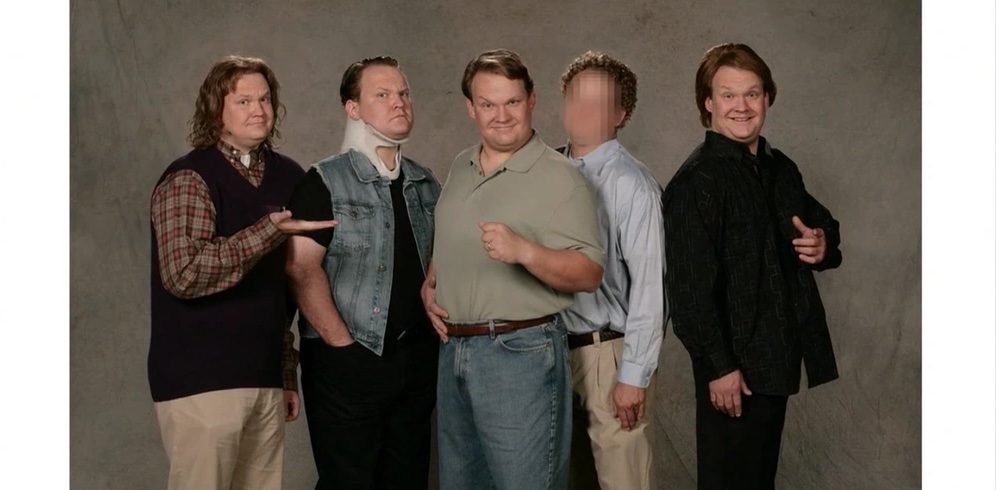
After losing Bob Loblaw as their lawyer, Michael urges everyone to pitch in to help raise money. Since no one in the family enjoys working, they host a legal defence fundraiser dinner—aptly titled “Save Our Bluths”—to raise money. At the model home, Lindsay regrettably takes up cooking, Tobias assumes the role of “discipline daddy” when he has to confront Maeby about not going to school, George Michael is struggling to communicate his feelings, and Gob accidentally ends up working a day in his life.
“S.O.B.s” begins with an announcer informing viewers about what the episode will entail, including live moments, surprise deaths, and a handful of celebrity cameos—all common gimmicks used to try and boost ratings. “The Bluths were desperate,” the Narrator underlines when the announcement ends—and they were, similarly to the series itself. While Arrested Development has continuously been self-referential, this episode stands out, as the Bluths’ struggles mirror the series’ real-life situation. Throughout the episode, the Bluths worry if they are likeable and relatable enough, which was a common explanation for the series’ low ratings. The episode also toys with the common criticism of why the series never gained a broader audience, which is often credited to the writing featuring references too obscure that few viewers understood.
Still, even when pushed into a corner—caught in a desperate situation with the threat of cancellation—the series admirably stayed true to its core. The writers seemingly throw nearly every imaginable idea at the wall to see what would stick. The result? An episode that is equal parts clever and ridiculous, and encapsulates everything that made the series great. There is a random 3D scene, “www.SaveOurBluths.org” flashes on the screen at one point, Michael notes that they do not have a shot with HBO (The Home Builders Organization) but that it may be “showtime” and Ron Howard breaks the fourth wall with his narration to say, “Please tell your friends about this show.” Andy Richter also appears by portraying quintuplets—a real-life reference to his own short-lived sitcom Quintuplets—which brings an incredible joke to the forefront, namely the decision to blur one of the faces on a family photograph despite them all looking identical.
“Development Arrested” (Season 3, Episode 13)
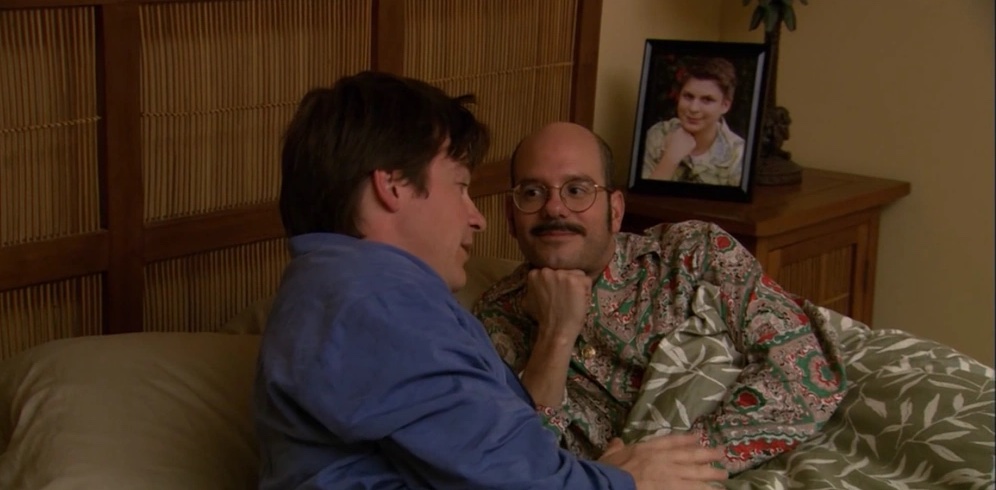
With the charges against George Sr. dropped, the future feels brighter and more hopeful than ever for the Bluths. To celebrate, the family decides to throw a yacht party, but the sailing is far from smooth. Buster has to confront his greatest fear, Lindsay is horrified to learn her real age, George Michael finds out that Gob has been dating Ann, Annyong gets revenge, and Michael is shocked to learn who holds the real power in his dysfunctional family.
A prominent element of this season finale is that it cleverly mirrors the pilot episode. Both episodes begin with a pan from the sky to reveal Michael at a yacht party, and both cold openings end with the Narrator explaining why Michael is in a certain mood (happy that he will never see his family again versus sad that he has to stay with them). Both episodes also feature Michael and George Michael feeling a certain way—in the pilot, George Michael wants to stay and Michael wants to leave, and in this episode, roles are reversed.
Tobias’s penchant for delivering gay innuendos and sexual double entendres continues, as does his cluelessness to them. In his newly-appointed role as event coordinator, Tobias ponders changing the theme for the party, but “Hot Seamen” is quickly dismissed by Michael. Other memorable jokes include Lucille confusing ‘alopecia’ with ‘alpaca’ and Michael waking to find Tobias in bed with him doing the same pose as George Michael does in the photograph in the background. Moreover, employee Ted (Charlie Hartsock) dresses up like Tom Cruise’s character in Risky Business (black sunglasses, white shirt with its collar up, no pants and white socks) due to the “Risky Business” banner at the office. This forces Michael to update the “Days Without a Workplace Injury” sign from 27 to 1 as Ted tries to recreate the famous sliding scene from the movie but fails.
“Colony Collapse” (Season 4, Episode 7)
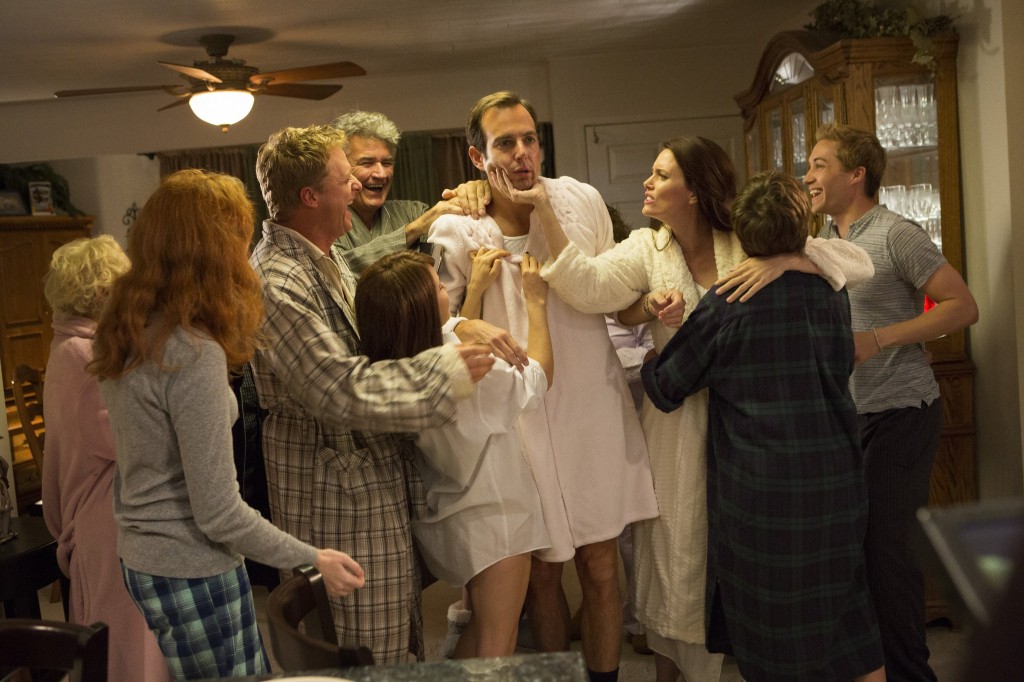
Unlike the previous three seasons, the original version of the fourth season presented all 15 episodes so that they could be watched in any order. Each episode covers approximately the same period but focuses on a different character. Because of this, information depicted in a specific episode is often partial and only filled in by later episodes. While doubtlessly ambitious, many fans felt this version lacked the comedic rhythm of the original, and the season was later recut into 22 interwoven stories presented in chronological order. Regardless of which version one prefers, Gob’s solo outing in the original is the best and made the entire experiment worth it.
In “Colony Collapse,” momentary highs give way to deep lows. Gob is about to marry Ann but turns the ceremony into another excuse for an illusion that will not only offend the very religious audience but also malfunction. After his relationship collapses and his family abandons him, Gob finds a new group of friends in pop icon Mark Cherry (Daniel Amerman) and his gang. After months of partying, Gob gets caught in a blur of debauchery and shame. To help him forget the shame, he starts the daily routine of taking Rohypnol, which leads to a dangerous cycle—and eventually stage four syphilis.
Throughout the series, Arnett has embodied Gob as a guy who thinks of himself as the chosen son despite the grim fact that not even his parents think much of him (Lucille even refers to him as the worst Bluth, which is a bold claim). Superficially, Gob is a carefree womaniser fond of flashy showmanship. However, beneath it all, indisputable alienation and sadness flourishes. A character like Gob could have easily felt purely obnoxious, but through Arnett’s performance, he is more than his façade. While this tragic streak has always existed, it is more pronounced in this concentrated episode that moves between silliness and heartbreak in the blink of an eye. Sometimes the appearance of these aspects—the funny and the tragic—are merged and intertwined, other times they appear separately. For instance, in this episode, Gob speaks to his son for an hour and a half without even noticing it—something simultaneously silly and sad. Moreover, this sentiment ties perfectly in with the recurring use of Simon and Garfunkel’s “The Sound of Silence,” a song that has followed Gob throughout the series, often during moments of dissociation. Even though the contemplative song is played for laughs, the longer the gag goes on, the less funny it feels watching it unravel.
Despite the despair, this episode features many humorous moments, including a parody of HBO’s Entourage. Gob is also revealed to not be as religious as he tries to convey to please Ann. At one point, Gob is frightened by a Jesus painting in her room (“For a second, I thought that was a real guy”) and when he finds a cross necklace, he—like Maeby in the “Motherboy XXX” episode—thinks the cross is a ‘T.’ Furthermore, since Ann is present, the episode features multiple people struggling to remember her name. Despite being such a long-running joke, the best use of it appears in this episode. After sex, Gob eats an egg in the kitchen while Ann asks him how he enjoys it. “I said you were fine,” Gob replies. While silly, it is a wonderfully executed joke that delivers a big payoff long after it was first introduced.

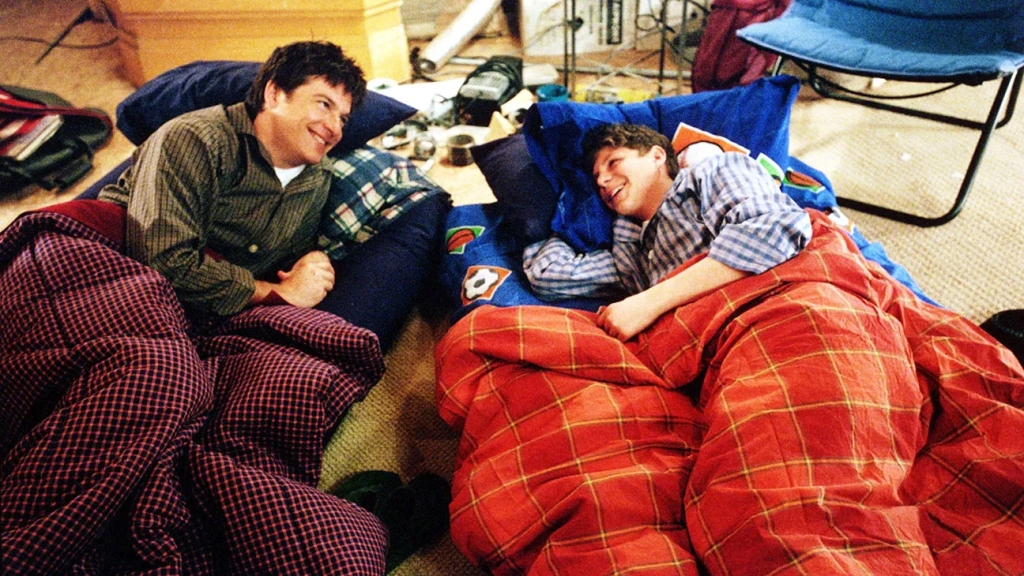
Leave a comment